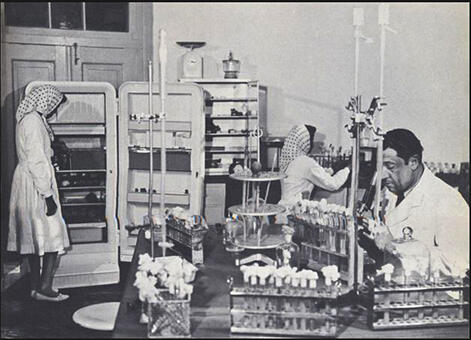 The Sealy Institute for Vaccine Sciences (SIVS) strives to create, perfect and promote the most effective and safest disease prevention strategies. However, to take a vaccine from the discovery phase to the marketplace requires a few
steps in between. Before vaccines can be tested in human clinical trials, researchers must do preclinical testing for safety and efficacy. In addition, vaccines for many biodefense and emerging infectious disease pathogens may be approved in the United
States under the alternative "Animal Rule" pathway, where pivotal efficacy studies in relevant animal models replace traditional phase III efficacy trials in humans.
The Sealy Institute for Vaccine Sciences (SIVS) strives to create, perfect and promote the most effective and safest disease prevention strategies. However, to take a vaccine from the discovery phase to the marketplace requires a few
steps in between. Before vaccines can be tested in human clinical trials, researchers must do preclinical testing for safety and efficacy. In addition, vaccines for many biodefense and emerging infectious disease pathogens may be approved in the United
States under the alternative "Animal Rule" pathway, where pivotal efficacy studies in relevant animal models replace traditional phase III efficacy trials in humans.
The SIVS has experience with basic research and nonclinical development and testing, and has internationally-recognized expertise in emerging and neglected infectious diseases. The SIVS
also has excellent resources and access to UTMB’s many core facilities. The SIVS can assist scientists and vaccine developers with:
- In vitro and in vivo research and development of biologically relevant animal models and supporting assays to study multiple infectious and non-infectious diseases
- Development and evaluation of new adjuvants and novel vaccine platforms
- Immunogenicity testing and in vitro antiviral screening using high-throughput robotic equipment
- Preliminary safety and toxicology studies in a variety of test systems
- Non-clinical studies for animal model qualification and vaccine efficacy testing for Animal Rule approvals in accordance with a quality system based on the principles of Good Laboratory Practices (GLP) for Nonclinical Laboratory Studies (21 CFR Part
58)
UTMB has research infrastructure available in state-of-the-art ACL2/3, BSL2/ABSL2, BSL3/ABSL3, and BSL4/ABSL4 capacity and aerosol challenge facilities. The SIVS welcomes collaborations with individual investigators, companies and government agencies,
both locally and internationally.